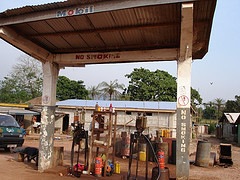S.Leone fuel freeze sparks chaos as price rise seen
 Filling stations halted sales in Sierra Leone on Monday in anticipation of a rise in prices, leaving taxi drivers short of fuel, public buildings without power and commuters stranded by the roadside.
Filling stations halted sales in Sierra Leone on Monday in anticipation of a rise in prices, leaving taxi drivers short of fuel, public buildings without power and commuters stranded by the roadside.
World oil markets surged to record highs earlier this month, prompting speculation that governments which set or subsidise pump prices will have to raise them to compensate.
Officials at the West African country's National Petroleum Unit, which sets fuel prices, were unavailable for comment, but Energy Minister Haja Kabba said fuel retailers were expecting a price increase within hours.
"They think the price will go up, so the stations are holding back fuel so that they sell at increased price later," she said.
"It's deliberate: after they will hear the increase, maybe later today, they will start to sell at increased prices, but the increase in the amount won't be much," Kabba told Reuters, adding that her own building, Electricity House, had no power.
The Petroleum Unit, an autonomous state body supervised by the Ministry of Trade & Industry, at present pegs the retail price at 13,000 Leones ($4.30) for a gallon of either diesel, gasoline or kerosene.
The fuel panic marks an early test for President Ernest Bai Koroma's new government after his inauguration last week, when he repeated his pledge to resolve an energy crisis before a crowd of tens of thousands of supporters.
Sierra Leone, rated second from bottom of the most recent U.N. Development Index, relies heavily on gas-guzzling private generators for electricity as the public power grid has barely worked since a brutal 11-year civil war that ended in 2002.
Taxi drivers desperate to keep their battered vehicles moving on Freetown's pot-holed streets were offering as much as 20,000 Leones for a gallon of fuel on Monday, often to no avail.
"People are standing waiting for taxis everywhere, crying for them to stop. But I don't have anything inside my tank right now. You can't see even black market fuel for now," said taxi driver Osman Bah, 27, after a morning spent searching for fuel.
"We are all trying to offer more money but they refuse."
As queues and anger mounted, management relented and started selling fuel again at one station beside Freetown's ancient Cotton Tree, a major landmark and symbol of the country's past as a hub of the trans-Atlantic slave trade and then as a settlement for freed slaves.
"The queue is too much," said pump attendant Morrison Fofanah, 40, as waiting cars stood backed up in the road.

